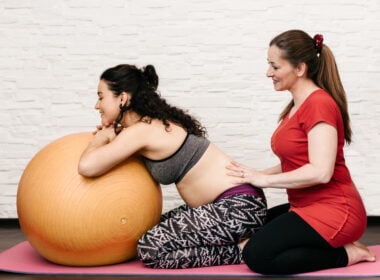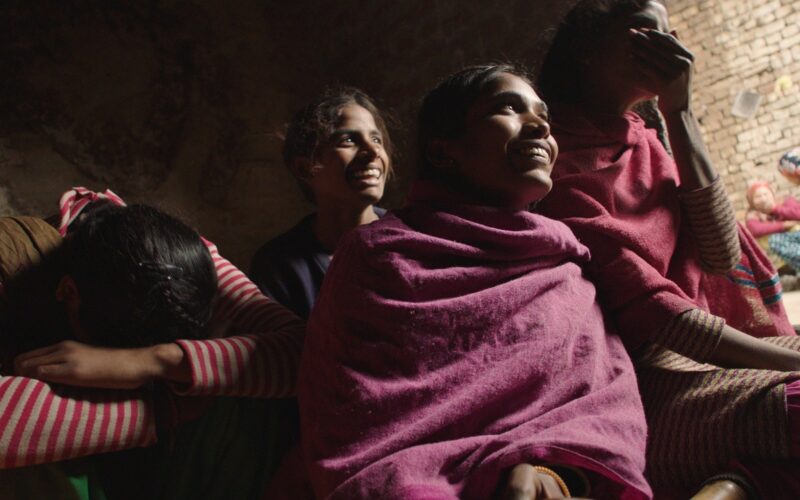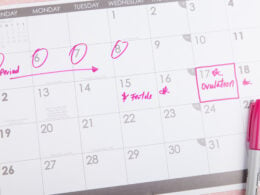If it seems surprising that a documentary on menstruation won the 2019 Oscar for Best Documentary Short, it’s because, well, it is. As exhibited by Period. End of Sentence., there is definitely still a strong stigma surrounding a woman’s period, particularly in developing countries like India. The 25-minute-long film was the initiative of the nonprofit organization, The Pad Project, and director Rayka Zehtabchi, and was filmed in a small rural village outside of New Delhi.
The Pad Project, created by a teacher and her students in Los Angeles, raises money for machines that make low-cost, biodegradable pads from locally-sourced materials, and these machines are then donated to women in impoverished areas of the world. As the nonprofit’s website explains, “the machine does more than just supply girls with pads: it supplies a steady income to the women in the area who want to work on it. In other words, this machine helps both girls and women gain independence.”
Period. End of Sentence. chronicles the installation of one of these pad-manufacturing machines in one poor Indian community and the subsequent empowering journey of the women who assemble the pads making a living for themselves. More than anything though, this documentary tells the story of the many women whose periods have adversely affected their lives due to their lack of resources and the stigmas surrounding menstrual health where they live.
As I watched the documentary, I couldn’t help but draw connections to the stigmas that still exist in my own country. It opened my eyes to the true need for fertility and menstrual health education not just in developing countries—but across the globe. Here are some of the reasons why this documentary is so important.
It reveals the very real menstruation taboo in India and its repercussions.
“I can’t say the words . . . I’m too shy.” One young girl shies away from the camera as she’s asked about her monthly period. Another young woman holds a small child as she admits to the camera, “Babies are born because of it [your period] and this is all I know.”
The camera then turns to a group of young men. When they are asked if they know what a period is, not one of them can supply the answer (other than what comes “at the end of a sentence”). When the word “period” is changed to “menstruation,” one of the men confesses that he has heard the word before, saying: “I think it’s an illness.”
Muruganantham, the man who created the pad manufacturing machine fundraised by The Pad Project, sums it all up when he says,“Menstruation is the biggest taboo in my country.” And as is made abundantly clear in the documentary, the fact that nobody talks about this vital function of the female body has severely impacted young girls and women.
One woman in the film shares how she studied in school until middle school, but how once she started having periods, it became too difficult to change the napkins (which were usually pieces of cloth or even leaves that were anything but sanitary), and she ended up dropping out altogether. Unfortunately, her story is all too familiar there. As The Pad Project’s website states, “When a girl gets her period in the United States, she may miss a class. When a girl gets her period in a developing country, she may never go to school again. A period should end a sentence, not a girl’s education. But, unfortunately, that’s exactly what’s happening all over the world.”
Young girls often suffer from infections during their periods due to the unsanitary rags they have to use (which they dispose of in the dead of night so no one sees them), and they also have to miss a lot of school; sadly, it is inevitable that the more they fall behind in school, the more likely they will have to drop out entirely.
In other developing countries, dangerous stigmas persist as well. In Nepal, women sequester in small huts when menstruating, and, the New York Times reports, “each year, at least a couple of women die in these huts from exposure, animal bites or smoke inhalation after building fires to stay warm during the Himalayan winter.”
However, this taboo is not unique to developing countries.
Even though Period. End of Sentence. may only reveal the menstrual taboo in a developing country, more advanced countries still have their own stigmas surrounding periods.
According to a report conducted last year by Bodyform and YouGov in the UK, 91% of high school girls worry about going to school when they are on their period, with over 350,000 girls in the report admitting that they’ve missed school due to their period. They share that this is equivalent to 2.1 million hours of missed education, with 27% of the girls polled stating that harassment and “period-shaming” were their reason for missing school.
When it comes to the boys, 94% of the boys polled admitted to not knowing a lot about periods and 72% of them said they have never had a dedicated lesson about periods. These numbers are even more concerning when considered that school lessons are the primary source of information concerning periods for both boys and girls.
The taboo is made worse by the lack of resources worldwide for those living in poverty. While most girls in developed countries take for granted their easy access to sanitary pads and tampons, according to the Water Supply and Sanitation Collaborative Council, over 1.2 billion women across the world do not have access to basic feminine hygiene products, making their periods consistently the most challenging time of the month. And yet, even access to pads and tampons cannot completely erase the menstruation taboo.
Just like the young girls in the documentary were curious yet embarrassed and confused about what a period is, girls around the globe go through the exact same feelings when they first get their period, or even hear the word “period.” Too many girls get their first period before ever having “the period talk.” And even if girls in developed countries only miss the occasional day of school, as opposed to having to drop out all together, finding the privacy and time to attend to hygiene during the school day is still a uniquely difficult problem that most girls have to deal with.
How teaching fertility awareness could erase the stigma—globally
In addition to giving women around the world easy and affordable access to sanitary feminine products, proper fertility education (beyond the typical sex education often implemented in schools) is necessary in order to make talking about periods and menstrual cycles a normal experience. By making fertility awareness a critical part of the “period talk” for young girls, much of the confusion, embarrassment, and overall taboo concerning a woman’s period is erased. After all, a woman’s period is vital for understanding her fertility.
At Natural Womanhood, we recently discussed an article at Raconteur highlighting the need for fertility education in schools. This article explained how the current model of sex education in schools is focused on the prevention of teenage pregnancy but talks little (if at all) about menstrual health or ovulation and fertility. When I was a teen and before I learned more about cycle health, the main idea I had about periods is that it was blood; I now know it is the shedding of the lining of the uterus, which is a completely different meaning—bleeding suggests loss, whereas normal shedding ties to a normal process relating to fertility. It reminds me of the difference between thinking monthly vaginal discharge is an infection vs. understanding it is healthy cervical fluid. Most schools around the world do not educate much about a woman’s overall reproductive health—although, according to a BBC report, it will be obligatory for schools in England to teach about periods and menstrual health by 2020. This is wonderful news, and we can only hope that other countries will soon follow suit.
The bottom line is that schools must play a better role in educating students to ensure that the stigma still surrounding periods is removed and that young girls are more comfortable talking about their menstrual and reproductive health and asking questions when they have concerns. Periods should be celebrated as part of womanhood (and an important part, at that) and not shamed or awkwardly joked about at school.
There are many myths surrounding teaching fertility awareness to teens, including that they will be too uncomfortable to discuss topics such as menstrual cycles and ovulation, and that learning how to chart their cycles using Fertility Awareness-Based Methods (FABMs) is too hard for them at this age. However, young girls are generally more curious than anything when it comes to learning about their reproductive health; after all, they simply want to understand what it is that their bodies are going through, and they don’t just want to find out bits and pieces secondhand from friends’ conversations.
There is no questioning that all girls—regardless of ethnicity, social or economic status—would truly benefit from learning about fertility awareness and how it relates to their menstrual cycle and overall reproductive health. When young women receive a real fertility education, their period is no longer a scary, confusing, taboo subject—it becomes something normal, good and truly useful for understanding their hormones, bodies, and future fertility. Awareness makes the female body’s functions empowering—not scary or shameful.
Resources for teen fertility awareness education
The Couple to Couple League realizes that mothers are in a special position to engage their daughters about the gift of their fertility. Their Mother / Daughter program lets you choose the resources you feel would be the best to communicate with your daughter about fertility awareness.
Teen STAR is a developmental curriculum founded by Hanna Klaus, MD (Sr. Miriam Paul , MMS) that helps adolescents and young adults to come to terms with their emerging sexuality and fertility and assist them in making responsible decisions.
The Cycle Show is an educational, interactive, multi-media, fertility awareness workshop for young girls.
The FEMM App helps girls understand their reproductive health in all its physical and emotional complexity.











